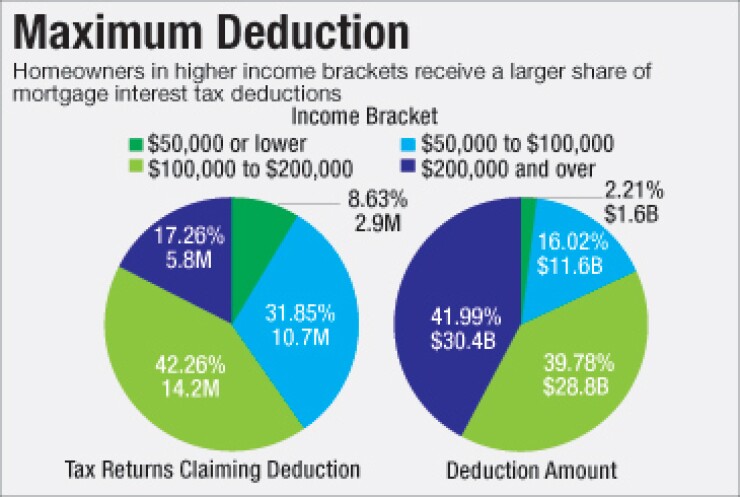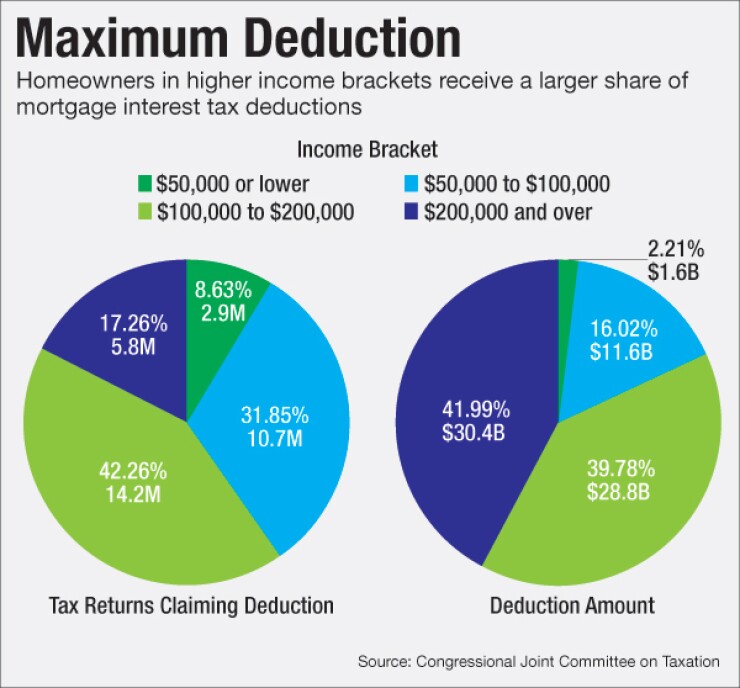

WASHINGTON — The mortgage interest deduction has been a pillar of U.S. housing policy for more than a century, but Congress appears ready to consider significant changes to it that some industry players worry could effectively render it pointless.
With Republican control of Congress secure and the White House soon to be in GOP hands, lawmakers are optimistic they can pass a bill that lowers tax rates and reduces a number of deductions. That includes the mortgage interest deduction, which under the current House plan would technically remain, but be effectively moot for nearly 95% of homeowners.
The House Republican Blueprint, which was unveiled June 24, calls for doubling the standard deduction that tax payers receive, which would mean that most people would have no need to take the mortgage interest deduction.
That is already drawing the ire of some in the mortgage industry, who argue it will reduce incentives for home ownership.
"We will oppose any attempt to devalue or reduce the mortgage deduction," said Jerry Howard, the chief executive of the National Association of Home Builders. "We believe the tax code should be used to encourage homeownership."
The Mortgage Bankers Association, National Association of Realtors and other groups are also alarmed about this "indirect attack" on the mortgage interest deduction.
"Because it is not a direct rollback of the mortgage tax deduction, I think there will be some concern in the housing industry that it will be harder to get legislators to focus on it," said Scott Olson, executive director of the Community Home Lenders Association.
At a Realtors conference last week, Rep. Frank Lucas, R-Okla., said he expects the Republican tax writers will likely use a budget reconciliation to pass a tax reform bill. Reconciliation clears the way for tax and spending cut bills without allowing filibusters in the Senate. As a result, the bill would need just a simple majority of senators.
The Oklahoma lawmaker warned the Realtors that they have should be concerned about the mortgage interest deduction. "I would say your concerns about the tax code are legit," Lucas said.
There are indications that the Senate Finance Committee would prefer to find a bipartisan solution, according to a source with knowledge of the process, but any compromise might not be acceptable to House Republicans.
"So reconciliation may be the only option," the source said.
Rep. Brad Sherman, D-Calif., who also spoke at the NAR conference, said he expects President-elect Donald Trump will defend the mortgage industry deduction.
"I think Donald Trump is caught between right wing think tanks and the economic needs of the people who elected him in Ohio, Pennsylvania and Wisconsin," Sherman said. "And I think he will pick Wisconsin voters over ideological think tanks. I think he will protect the 30-year fixed mortgage and mortgage interest deduction."
But there are signs that Trump's team already has the deduction in its sights. In a recent CNBC interview, Treasury Secretary-designate Steven Mnuchin backed a separate effort that would
The current standard deduction is $12,600 for a married couple filing jointly and $6,300 for single payers. If its doubled to $25,200, only the very wealthy with lots of charitable contributions could take advantage of the mortgage deduction, especially if the tax writers succeed in eliminating the deduction for state and local taxes too.
For most taxpayers, the proposed tax reform will simplify their taxes. But the mortgage deduction has been a big tax incentive for buying a home as opposed to renting. Industry officials are concerned a devaluation of the mortgage interest deduction will reduce home buying activity.
"Right now housing has a huge potential for growth. Don't mess with the recovery in housing. Even a discussion of mortgage interest deduction is counterproductive right now," said Lawrence Yun, the chief economist of NAR.
He also noted that young homebuyers generally benefit the most from the mortgage interest deduction. It becomes less valuable for older homeowners the longer they stay in their homes.
Other industry players are also concerned.
"It would be a mistake to do anything that has the potential to hurt homeowners and the housing market that contributes so much to the national economy," wrote David Stevens, the president and chief executive of MBA, in a recent blog.
But Stevens has publicly said he would support some change to the mortgage interest deduction, so long as it was part of comprehensive tax reform.
"If the entire tax code were to be looked at through a formal process and it was thorough and the mortgage interest deduction then became part of that dialogue, we certainly would support that," Stevens said in August.
But Lucas warned that the economy is not on the "firmest footing" right now and reducing the impact of the deduction could "turn off construction." The Oklahoma Republican also warned that passing tax reform is easier said than done.
"There is a lot of bravado as we begin this administration. But when we get into the tax issues, we will see why the last big tax reform bill was 1986 and before that 1954," he said.




